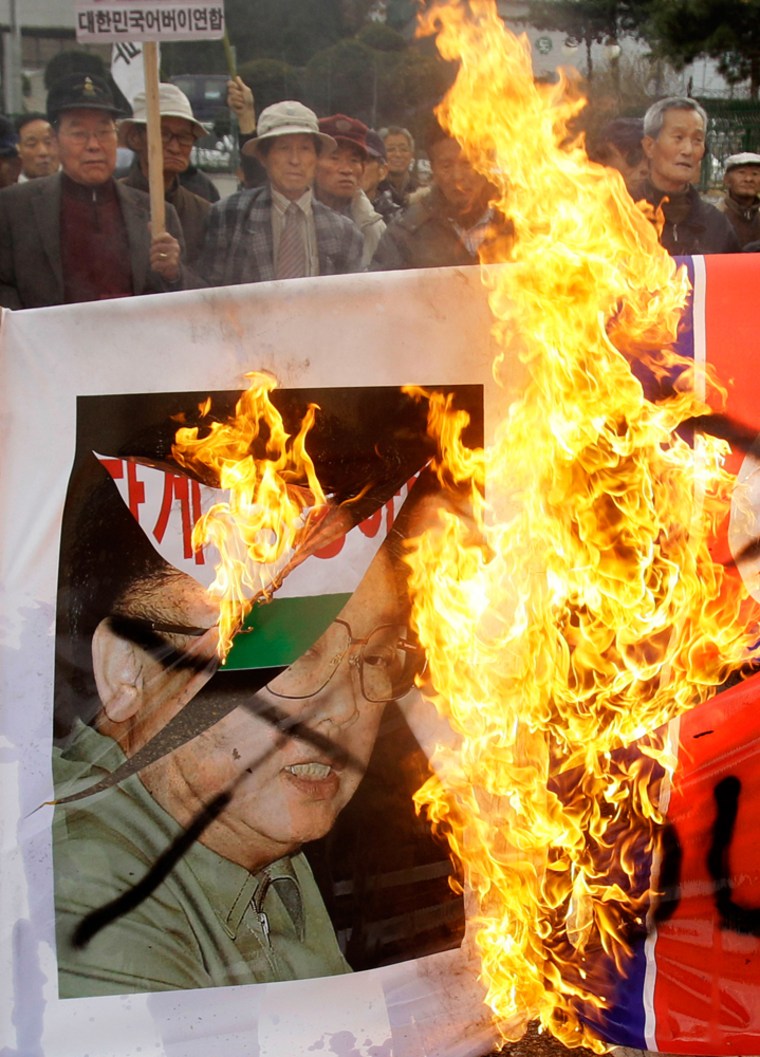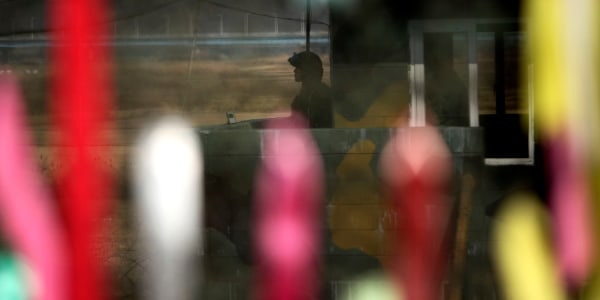South Korea's president vowed Thursday to boost security around islands near the site of this week's artillery attack by North Korea.
His order to beef up security came as North Korea warned of more "retaliation" if Seoul carries out "reckless military provocations."
"We should not let our guard down in preparation for another possible North Korean provocation," South Korean President Lee Myung-bak said at an emergency government meeting Thursday.
South Korea will boost ground troops on Yeongpyeong and four other islands in western waters in response to this week's attack, reversing a 2006 decision calling for an eventual decrease, presidential spokesman Hong Sang-pyo said. He declined to discuss specific numbers for the increase, but said troops there currently amount to about 4,000.
Meantime, Washington and Seoul prepared for joint drills involving a U.S. nuclear-powered supercarrier in the Yellow Sea.
The North made no specific mention of those drills but says its "military will launch second and third strong physical retaliations without hesitation if South Korean warmongers carry out reckless military provocations."
The statement on North Korea's state media blamed the U.S. for South Korean military drills earlier in the week that Pyongyang says sparked its attack Tuesday that left four dead and put the region on edge.
It said Washington "should thoroughly control South Korea to ensure they won't continue adventurous military provocations" such as violations of a disputed sea border.
The warning was issued by North Korea's military's mission at the truce village of Panmunjom and was carried by the country's official Korean Central News Agency.
The bombardment Tuesday of a tiny South Korean island along a disputed maritime frontier killed at least four people, sparked a brief skirmish and alarmed world leaders including President Barack Obama, who reaffirmed plans for joint maneuvers with Seoul in waters south of the clash starting Sunday.
The Obama administration urged China to use its influence to rein in its ally North Korea, with the chairman of the Joint Chiefs of Staff, Admiral Mike Mullen, saying that "We really think it's important for the international community to lead, but in particular China."
In other developments:
- Tuesday's artillery attack was likely personally ordered by Pyongyang's reclusive leader Kim Jong Il, Seoul newspapers reported. Kim and his son and designated heir, Jong Un, visited the coastal artillery base from where shells were fired at Yeonpyeong just hours before the attack. South Korea's military was "focusing on the possibility of Kim Jong Il and his son approving the shelling of Yeonpyeong," the Chosun Ilbo quoted an unnamed member of the National Assembly's Defense Committee as saying.
- Seoul and Washington prepared to hold joint military exercises involving the aircraft carrier USS George Washington starting Sunday in the Yellow Sea, just 70 miles south of Yeonpyeong, the island shelled by North Korea on Tuesday. The drills, although previously scheduled, are sure to infuriate North Korea. "Over telephone talks with Secretary (of State) Hilary Clinton, we agreed that through the drill, we will be able to ...send a clear message to the North in relation to the recent situation," a South Korean foreign ministry spokesman said.
- South Korea said on Thursday a planned visit by Chinese Foreign Minister Yang Jiechi later this week has been put on hold due to his "schedule issues." The Foreign Ministry said in a statement both countries plan to set a new date for Yang's visit, but did not elaborate on the cause for delay.Residents of Yeongpyeong who evacuated the island and began arriving at the South Korean port of Incheon on Wednesday told harrowing tales of fiery destruction and narrow escapes.
Island terror
Ann Ahe-ja, one of hundreds of exhausted evacuees from Yeonpyeong island arriving in the port of Incheon on a rescue ship, said the artillery barrage that killed four people — two of them civilians — had caught her by surprise.
"Over my head, a pine tree was broken and burning," Ann told AP Television News on Wednesday. "So I thought 'Oh, this is not another exercise. It is a war.' I decided to run. And I did."
About 10 homes suffered direct hits and 30 were destroyed in the midafternoon barrage, according to a local official who spoke by telephone from the island just seven miles from the North Korean shore. About 1,700 civilians live on Yeonpyeong alongside South Korean troops stationed there.
"I heard the sound of artillery, and I felt that something was flying over my head," said Lim Jung-eun, 36, who fled the island with three children, including a 9-month-old strapped to her back. "Then the mountain caught on fire."
China 'pivotal'
The Obama administration called the attack a "premeditated" violation of the truce that ended the Korean War.
As the isolated North's only ally and main economic partner, China plays a "pivotal" role in reducing tensions and has a duty to tell Pyongyang that deliberate acts "specifically intended to inflame tensions in the region" are not acceptable, the State Department said.
"China is pivotal in moving North Korea in a fundamentally different direction," State Department spokesman P.J. Crowley told reporters. "We expect China to be clear, like we are, as to where the responsibility for the current situation, the current tension lies. This is something that we feel strongly about."
Crowley said U.S. diplomats had delivered that message to Chinese officials in Washington and Beijing in the aftermath of Tuesday's North Korean artillery attack on a South Korean island.
Secretary of State Hillary Rodham Clinton is expected to discuss the attack and the response to it by telephone with China's foreign minister, Crowley said.
Adm. Mike Mullen, chairman of the Joint Chiefs of Staff, echoed the point of China's importance in the process in an interview to be aired Sunday on CNN's "Fareed Zakaria GPS."
"We really think it's important for the international community to lead, but in particular China," Mullen said. "It's a very dangerous area when he (North Korean leader Kim Jong Il) does this, it destabilizes the region, and China has as much to lose as anybody in that region with the continuation of this kind of behavior and what the potential might be."
Chinese Premier Wen Jiabao called on all sides to show "maximum restraint" over recent tensions on the Korean Peninsula and says his country opposes military provocations of all forms.
Wen also urged the international community to work to ease tensions. He repeated Chinese calls for renewed six-nation talks aimed at persuading North Korea to dismantle its nuclear programs.
Wen said those talks, involving the two Koreas, China, Russia, Japan and the United States, are the best way to ensure stability on the peninsula and its denuclearization.
Wen's remarks were made in Russia on Wednesday on a state visit and posted on the Chinese Foreign Ministry's website.
Slideshow 38 photos
Tension in the Koreas
U.N. Secretary-General Ban Ki-moon called the shelling of the island near the two nations' disputed maritime border one of the "gravest incidents" since the Korean War.
U.S., Seoul partners
South Korean troops remained on high alert. In Washington, Obama pledged to "stand shoulder to shoulder" with Seoul.
The U.S. has more than 28,000 troops in South Korea to guard against North Korean aggression, a legacy of the bitter three-year conflict that ended in a truce, not a peace treaty, in 1953.
North Korea, earlier laying out its version of events, said the army warned the South several times that firing "a single shell" in its waters would draw a "prompt retaliatory strike." A military official phoned a South Korean counterpart at 8 a.m. to urge Seoul to cancel the drills, the North's news agency KCNA reported.
But the South Koreans — displaying their "crafty and vicious nature" — went ahead and fired dozens of shells some five hours later, prompting a defensive response, the report said.
A spokesman for North Korea's Foreign Ministry said Wednesday night that troops acted defensively in response to "extremely reckless military provocation," the North's official Korean Central News Agency said.
In Pyongyang, residents boasted that the exchange showed off their military's strength and ability to counter South Korean aggression.
"I think this time our military demonstrated to the whole world that it doesn't make empty talk," Ri Pong Suk told TV news agency APTN in the North Korean capital.
Artillery and gunfire break out sporadically along the land and maritime borders dividing the two Koreas, and have brought deadly exchanges four times since 1999.
In March, North Korea was accused of sinking a South Korean warship, the Cheonan, killing 46 sailors. Pyongyang has denied responsibility.
The North's most notorious act was the 1987 bombing of a South Korean airliner that claimed 115 lives. And in 1996, a group of North Korean spies slipped ashore from a submarine and killed three civilians and a South Korean army private.
South Koreans see Tuesday's killing of civilians as taking the confrontation to a new level, one analyst said.
"It's clearly a line for people, and crossing that line puts it in a different category," said John Delury, an assistant professor at Seoul's Yonsei University Graduate School of International Studies. "People here are feeling very conflicted, outrage and sorrow."

